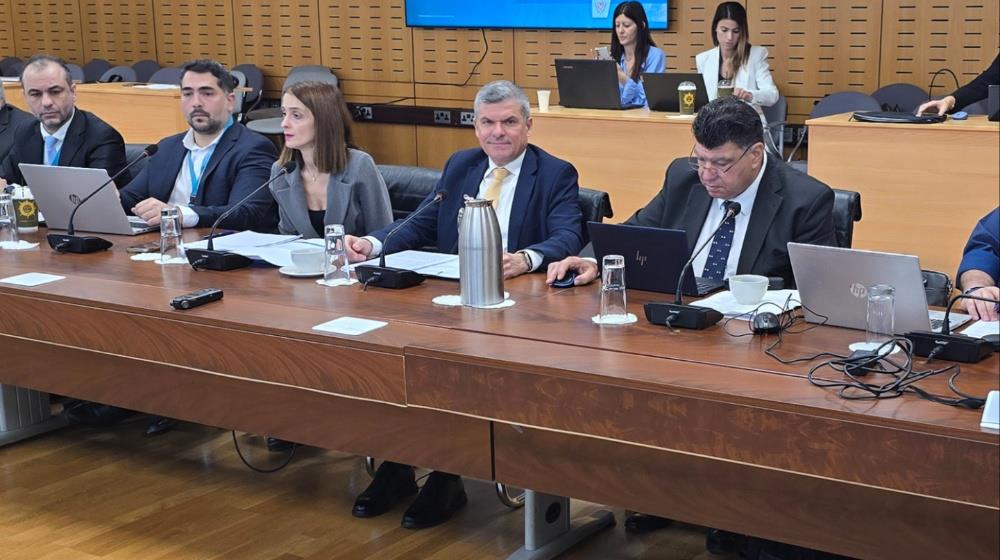Cyprus and Greece’s Ministers of Energy will meet with the European Commissioner for Energy on 12 November to discuss the challenges surrounding the Great Sea Interconnector (GSI), Cyprus’ Energy, Commerce and Industry Minister, George Papanastasiou, has told the House Finance Committee.
Presenting his Ministry’s 2026 budget on 31 October, he also announced that the final investment decision for the “Cronos” gas field is expected by the end of 2025 or early 2026, expressing hope that a gas sales agreement will be reached within November.
On the “Aphrodite” gas field, the Minister said the Front-End Engineering Design (FEED) phase will be completed by the end of 2025, while the final investment decision is anticipated by the end of 2026.
Budget and development priorities
The Ministry’s 2026 budget amounts to €118.98 million, including €68.25 million in development spending and €50.72 million in operating expenses. Papanastasiou said that despite a reduction in the development budget, it has been agreed with the Finance Ministry that additional funds will be requested as projects mature. He noted that many initiatives under the Recovery and Resilience Plan are ongoing and remain a top priority.
GSI ownership and challenges
Responding to reports suggesting that he had said the GSI project is “owned” by the European Commission, Papanastasiou clarified that his statement referred to the term “project owner” in the English sense, the entity responsible for overseeing implementation, not legal ownership.
He explained that while the ownership title was recently transferred from EuroAsia Interconnector to GSI (ADMIE) following a decision by Cyprus’s energy regulator, the European Commission remains the body with the authority to withdraw support for the project if necessary.
The Minister confirmed that the European Public Prosecutor’s Office’s current examination of the project relates to a complaint concerning the previous project operator, EuroAsia Interconnector.
Papanastasiou stressed that the GSI remains a project supported by the Cypriot Cabinet. He has been authorized to sign a memorandum of understanding with Greece that includes several clauses, among them a financial commitment of €25 million.
“The challenges of the project — geopolitical, economic, and technical — have been brought to the attention of the European Commissioner,” he said, adding that the meeting between the Cypriot and Greek Ministers and the Commissioner could be moved to an earlier date.
“The Commissioner himself requested this meeting to understand the issues and work toward resolving them,” Papanastasiou noted.
LNG terminal at Vasilikos and “Prometheus” vessel
Turning to the LNG terminal at Vasilikos, the Minister said that €67 million in EU funding has not been lost, contrary to reports, as these funds form part of a €101 million grant. The reasons for the Commission’s request for clarification, he said, concern the project’s tender award, its management, and the scoring process.
The project is now undergoing an assessment to identify discrepancies between its design and implementation, with a report expected next month. “Once we have the findings, we’ll decide whether to proceed with the existing plan or adopt an alternative design,” he said.
Regarding the floating storage and regasification vessel “Prometheus”, Papanastasiou said that it will be completed this month and is certified, pending two final conditions.
Natural gas developments: “Aphrodite” and “Cronos”
The Minister confirmed that the “Aphrodite” development and production plan has been agreed with investors and that seabed surveys between the field and Egypt’s shore connection point are ongoing within the two countries’ exclusive economic zones. By the end of November, the designated research vessel will complete its work, allowing the final route of the gas pipeline from Block 12 to Egypt to be decided.
The preliminary design (Pre-FEED) is set for completion this November, with the detailed FEED design expected by the end of 2025, paving the way for the final investment decision by late 2026.
As for the “Cronos” field, Papanastasiou referred to the recently signed agreements involving Cyprus, Egypt, investors Eni and TotalEnergies, and three Egyptian infrastructure owners, including those at the “Zohr” field. The gas from “Cronos” will be transported through Zohr’s infrastructure to Egypt’s Damietta terminal for liquefaction and export as LNG.
“We are one step away from selling Cypriot natural gas to interested buyers,” he said, noting that Eni and TotalEnergies are expected purchasers. “The final investment decision will follow these agreements by the end of 2025 or early 2026.”
The Minister also outlined strategic priorities for 2026, including sustainable hydrocarbon development, continued exploration within Cyprus’s Exclusive Economic Zone, and enhanced regional energy cooperation. He also reaffirmed commitments to affordable energy prices, accelerating the green transition, strengthening business competitiveness, and improving consumer protection.
(Source: CNA)









